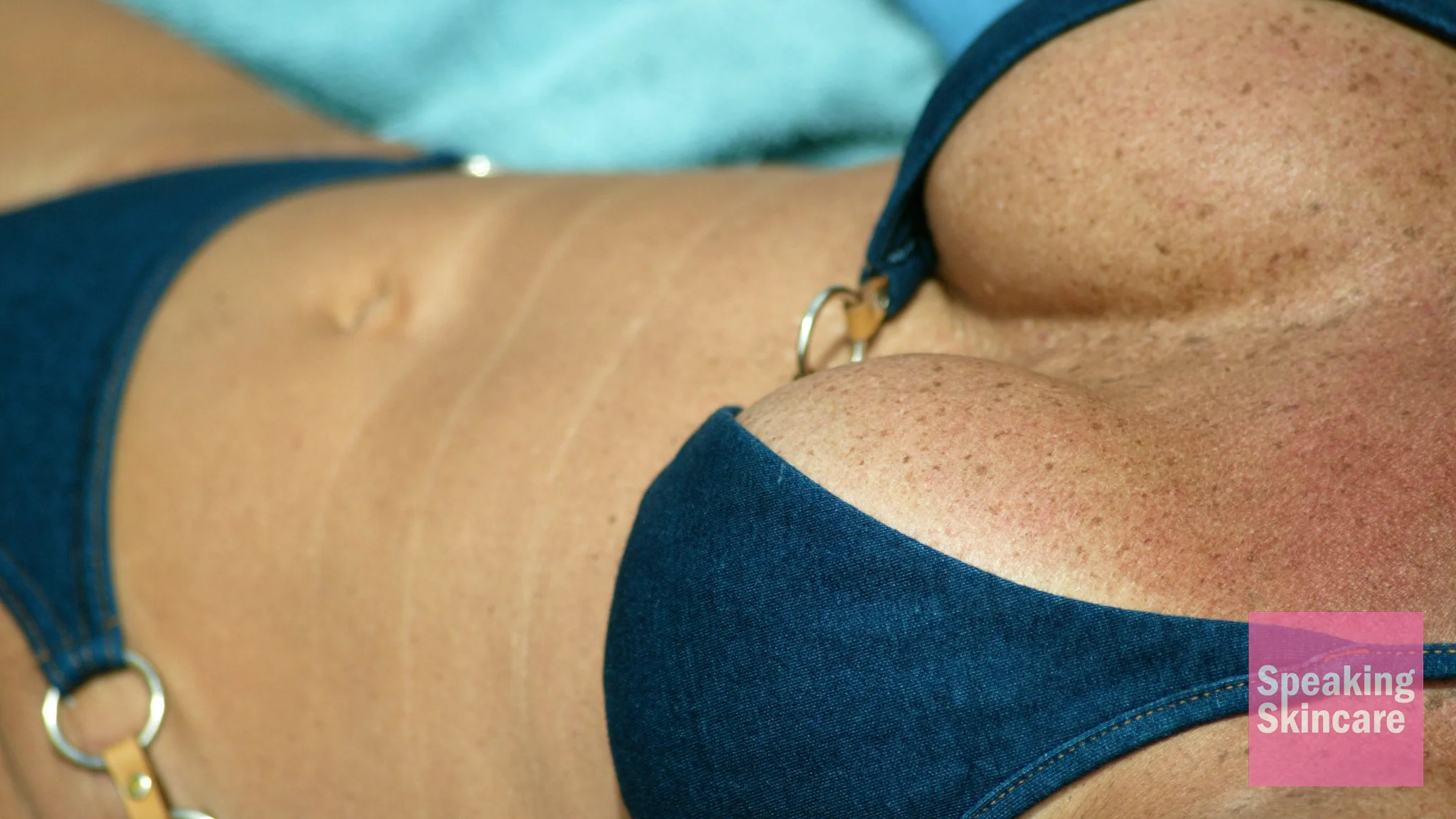Developing dark spots between your breasts is an incredibly common skin issue that affects millions of women. While it’s extremely rare that dark spots are a sign of a medical problem, they can change our appearance in ways we may not want.
In this article, we’ll briefly cover what exactly dark spots are, how they form, and how you can treat them. More specifically, if you have a lot of dark spots on or between your breasts, you’ll definitely want to read on to learn how to effectively remove them.
Let’s go.
What are dark spots?
Dark spots, otherwise known as hyperpigmentation, age spots, and liver spots, are small areas of the skin that grow darker or discolored over time. Ranging from light brown to dark brown, and in some cases, even black, dark spots can emerge on every area of the body. However, the most common places they pop up include hands, face, back, legs, shoulders, and breasts.
How dark spots between your breasts are formed
Dark spots and hyperpigmentation form when the body creates too much melanin. There are several reasons why this may happen. Here are the most common circumstances that can trigger an over-production of melanin.
Sun damage
Perhaps the most obvious cause of dark spots and hyperpigmentation is related to the sun. We all want that gorgeous golden tan, but spending too much time exposed to the sun can damage the skin. The sun’s UV rays are extremely powerful and can sting, burn, and irritate the skin. When this happens, the body enters a natural defensive state and produces melanin to help the healing process. In turn, this excess melanin contributes to the formation of dark spots and hyperpigmentation.
Hormonal changes
Our hormones can be influenced and affected by a number of things. Women especially are prone to hormonal fluctuations during puberty, pregnancy, and due to reactions to certain medications. It goes without saying that such changes can trigger the body into producing melanin, which then leads to hyperpigmentation and dark spots appearing.
Inflammation
Inflammation is one of the most underdiagnosed issues in all of skincare. Inflammation can directly result from other conditions such as skin irritation, acne, eczema, and other forms of blemishes and damage. Once again, the body creates melanin as a healing response, which causes dark spots.
Ingrown hair
Hair follicles are constantly in flux. When old hairs fall out, they leave room for new hair to grow. However, sometimes these new strands can get caught under the skin and become ingrown. When this happens, the area around the hair can become inflamed, red, bumpy, and sensitive. In this scenario, your body will enter a protective response and try to heal the problematic patch of skin. How does it do this? That’s right, by producing more melanin which can lead to dark spots forming. Always take care when dealing with ingrown hair.
How to remove dark spots between your breasts
If you’re having problems with dark spots on your body, in particular your breasts, there are several things you can do to minimize their prominence and restrict them from forming in the future.
Here are some tips.
Laser treatments
Perhaps the most invasive procedure available for treating dark spots is laser removal. Usually performed by a professional dermatologist, laser treatments can be an effective way of reducing the appearance of dark spots and removing patches of hyperpigmentation.
To make sure whether this is the best option for you, talk to a qualified professional for a personal evaluation.
Chemical peels
Chemical peels are powerful exfoliators that work to dissolve and scrape away targeted areas of skin. This is designed to stimulate the growth of healthy new skin cells and may be a good way of reducing the sight of dark spots over a period of time.
Skin-brightening creams
A softer and less intensive method of removing dark spots from your breasts and from other parts of your body is by using skin-brightening creams and serums. There is a large variety of brightening creams that range in strength, some can be bought over the counter and others need to be prescribed by a doctor or dermatologist. Finding the right cream for you will require trial and error.
Consume more glutathione
Glutathione is a powerful antioxidant that is used in a wide range of brightening products. However, it is also present in natural foods that you can incorporate into your diet.
Some of these foods include:
- Fish
- Chicken
- Eggs
- Nuts
- Garlic
- Onions
Research is currently ongoing as to the effectiveness of glutathione on skin-brightening, but consuming more of it through natural means may give your body a better chance of preventing the formation of dark spots.
Sun protection
Perhaps the best method for preventing the formation of hyperpigmentation and dark spots in the future is by taking the steps to protect your skin from the sun properly.
The best way to do this is by always wearing adequate sunscreen whenever you are being exposed to the sun, or even when you go about your daily business in any weather. It doesn’t need to be a scorching hot day for the sun to damage your skin, even mild and overcast weather can lead to problems.
By consistently remembering to protect your skin with sunscreen, you will significantly reduce the chances of dark spots forming on your breasts and other parts of your body, as well as reduce your chances of developing more serious issues such as skin cancer.[1]
Conclusion
There you have it! Dark spots aren’t a health concern, but they can look unsightly and people may want to remove them. By following the tips above, you can make a lot of progress in minimizing hyperpigmentation wherever it occurs.
For removing dark spots on breasts specifically, you should take steps to use powerful sunscreen whenever you decide to go tanning, as well as implement brightening creams and exfoliators.
References[+]
